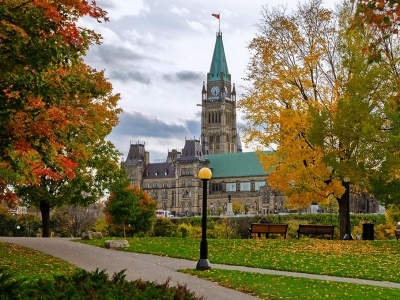Visit Carleton’s COVID-19 website.
July 12, 2021
To all Members of the Carleton Community,
The health and safety of all members of the Carleton community continues to be our top priority. All units in phase 3 are continuing to prepare their return to campus and staffing plans to ensure we can provide face-to-face support for our students on campus starting August 23. These plans will be communicated to staff within the coming weeks. In line with the Carleton University Scenario Planning (CUSP) recommendations, classes with reduced classroom occupancy are scheduled to be delivered on campus and large classes are scheduled to be delivered online.
We are continuing to assess the impact of Ontario’s announcement regarding the province’s move into Step 3 of its Roadmap to Reopen plan on our operations and once we receive more details, we will keep the community updated. In the meantime, the Return to Campus team is continuing to prepare and put in place the following measures to help ensure everyone’s health and safety as we return to campus.
New Screening Tool (cuScreen)
At this time, in line with government regulations, screening will continue to be required for anyone coming to campus and entering a Carleton building. Carleton is currently implementing a new, robust COVID-19 screening tool for the fall. cuScreen will be easier to use and has more functionality in terms of completing self-screening requirements and recording access to campus, buildings, classrooms and offices through the use of QR codes. cuScreen will operate using your MC1 credentials and is accessible on any web browser, including on your phone. Additional information on cuScreen will be provided to the community in August in advance of its launch.
In the meantime, anyone currently coming to campus must follow the appropriate building access protocol and complete the mandatory COVID-19 Daily Campus Access and Screening Form each day before coming to campus.
Building Ventilation
Across campus, the main air handling systems in all buildings have been fitted with high efficiency (MERV 13) filters. All main air handling systems are providing pre- and post-occupancy flushes of ventilation air at least two hours before occupancy and two hours after occupancy. The systems are continuously monitored throughout the day by Facilities Management and Planning (FMP) Building Operations staff and FMP has engaged a third-party consultant to verify and recommission ventilation systems. More information is available on the ventilation strategy for the return to campus website.
Ambassador Program
To support and encourage community compliance with public health regulations, Carleton will be implementing an Ambassador program on campus in the fall. Ambassadors will be spread across our facilities to help provide guidance on screening measures and to provide encouragement to the community to follow all public health regulations and restrictions. The Ambassadors will be assisted by Student Safety Patrollers and Campus Safety Officers, who will be tasked with securing buildings and will be directing members of the community to designated entrances and exits as per posted signage.
Capacity Limits and Physical Distancing
Each unit has been given capacity limits as part of its return to campus plan in line with physical distancing requirements. Carleton University will also monitor overall building capacity through the use of QR code scanning in the new cuScreen system and through the Ambassador program. Signage has been posted across campus to direct appropriate traffic flow within buildings to assist with physical distancing requirements.
Mask Requirements
At this time, it is likely non-medical masks will be required on campus in the fall term in line with public health requirements and Carleton’s Mask Policy. Mask requirements will follow guidance and regulations from the Government of Ontario, the City of Ottawa and Ottawa Public Health.
Cleaning Protocols
Facilities Management and Planning (FMP) has cleaning protocols for buildings, classrooms, common spaces and study spaces. Additional resources are being secured to ensure compliance with public health cleaning guidelines.While custodial staff will clean internal departmental spaces (such as departmental offices, administration offices, graduate offices and teaching assistant offices) on a weekly basis, employees are responsible for wiping down their personal workstations (including desk surface, chair, keyboard, computer, etc.)
Hand Sanitizer Stations
Hand sanitizer stations have been deployed at building entrances for students, faculty, staff and community members to use while on campus. These stations are monitored regularly to determine the frequency of use. Depending on the traffic volume, additional stations will be deployed as needed. Should a hand sanitizer station require servicing, individuals are encouraged to notify the FMP Service Desk. Additional hand sanitizing mitigation measures are outlined in each unit’s approved return to campus plan.
Personal Care Kits
Members of the Carleton community (e.g., staff, faculty, contract instructors, teaching assistants, students living in residence) can obtain a personal care kit, free of charge. Each personal care kit contains two reusable three-ply face coverings, a two-ounce bottle of hand sanitizer and an ear saver.
Managers and supervisors should refer to the Return To Campus Purchasing Guide for more information on how to obtain personal care kits for their areas of responsibility.
Water Treatment and Legionella Testing
Carleton University has been regularly flushing the water in our buildings, as well as testing for the presence of any Legionella bacteria since March 2020 to ensure the safety of all members of our campus community. Carleton University has also been following the testing protocols as outlined in the Public Works and Government Services Canada Standard, MD15161-2013 Control of Legionella in Mechanical Systems. In addition to Legionella testing, Carleton conducts regular testing of our cold-water systems to ensure our drinking water remains healthy and safe. More information is available on the water treatment program and legionella testing website.
Tunnel Access
At this time and to facilitate physical distancing, we anticipate the tunnels will remain restricted to authorized individuals only and those with approval for accessibility purposes. Access requests should be directed by email to your manager, supervisor, dean or relevant approver. They will submit your tunnel access approval to covidinfo@carleton.ca.
Supplies
To facilitate the safe and gradual return to campus, departments can place orders for critical items through eShop. Departments will be able to order the necessary supplies directly from appropriate vendors or from Procurement Services, as outlined in the Return To Campus Purchasing Guide including personal care kits.
The vaccination rates across Ontario and Canada continue to accelerate. It’s important that individuals receive both doses of the vaccine to boost their immunity and help everyone return to campus safely.
Health and Counselling Services is continuing to provide vaccination clinics to faculty, staff, students and approved contractors. Appointments are still available on July 13 and 14, 2021 and additional clinics are being planned for August. We strongly recommend all members of the Carleton community get vaccinated as soon as possible.
For additional information on protocols and mitigation measures in place for the health and safety of the Carleton community, please visit the COVID-19 website for more details. Staff who have further questions relating to their unit should speak to their supervisor/manager.
I wish everyone a restful summer and hope you are all able to enjoy some well-deserved time off.
Sincerely,
Suzanne Blanchard
COVID-19 Lead
Monday, July 12, 2021 in Campus News, Coronavirus
Share: Twitter, Facebook



